Best WordPress Custom Post Type Plugins: How to Create Custom Post Type

Looking for a way to add custom posts and pages with diverse properties and augmented layouts? Well, adding custom post types can help enhance the functionality of your WordPress website. Here, I have listed WordPress Custom Post Type Plugins that will help you do that and much more.
Content is the most crucial part of a website, as it makes it easier for visitors to understand the products and services you provide. WordPress offers many built-in content types that are best-suitable for simple blogging websites. However, many times you would like to create a custom look for your website. Custom post types can help you create a personalized WordPress website, however the way you like. You can also use various content categories to make your website look more appealing.
With custom post types you can change your basic WordPress website into a fully functional custom Content Management System. Custom posts will also add a unique touch to your website, and make it stand out. You may want to define your own content types with features that are not available by default. If you plan to create a more complex website or simply want to personalize your website, you can use custom post types. Besides, custom post types also give the flexibility to create any type of content. In simple words, custom post types help you get the attention of the visitors, and enhance the overall experience. So in this post, we bring to you the best WordPress custom post type plugins, learn how to create custom post type on WordPress, and more.
Here at our WordPress them generator and website builder software, I will also do a feature comparison of some of the popular WordPress Custom Post Type Plugins.
What is WordPress Custom Post Type Plugin?
WordPress stores and displays content as posts and categorises them based on post types. A page on a WordPress site is of post type “page” and a post on a blog is of type “post”. WordPress some post types that are native to WordPress. These predefined post types are:
- Post
- Page
- Attachment
- Revision
- Navigation Menu
- Custom CSS
- Changesets
A custom post type is a custom defined piece of content. These are new post types that you define and create for the custom content. The new post type is registered to WordPress as a custom post type. A custom post is a regular post, but has a different post_type value in the WordPress database. Some custom post type examples are:
- Media
- People
- Products
- Events
- Places
- Online Store
- Testimonials
- Quotes
- Error Log
Why Do You Need WordPress Custom Post Type Plugin?
Well, by now you would know that WordPress custom post type plugin allow you to display the content in a specific way. However, if your content does not fit in post or page category, then it is wise to use custom post type. Thus you can provide more information that is specific, rather than using default post types. In addition, you can also set the post layout on every page of your website.
If you are still confused on when to use custom post types, then follow the guidelines below to decide:
- You publish diverse types of content like blog entries and recipes.
- You want to distinguish a specific type of content in the way it is structured and displayed. For example: a blog and a portfolio.
- If some content does not fit a chronological order like a company blog and style guides.
- If a content type is isolated and can be moved to a different website and remain comprehensible. For example, a list of sold products.
- If your content is not complicated and does not require using categories and tags. For example, movie reviews.
The simplest approach to create custom post types in WordPress is to use WordPress custom post type plugins. It is safe and easy and recommended for beginners. There are a number of plugins available that make creating custom post types easy and give incredible results. here at Templatetoaster WordPress theme builder, shocases list of a few WordPress custom post type plugins that are worth trying out.
List of the best WordPress Custom Post Type Plugins
- Custom Post Type UI
- Pods
- Custom Post Types and Custom Fields creator – WCK
- Toolset Types
- Custom Post Type Maker
- MB Custom Post Type
- Custom Post Types Unlimited
- Custom Post Type Generator
First, Let us look at a brief comparison of these WordPress plugins w.r.t what features each provides for supporting custom post types.
Comparison Chart of Best WordPress Custom Post Type Plugins (2024)
| Best WordPress Custom Post Type Plugin | Custom Post Type UI | Toolset Types | WCK | Custom Post Type Maker | Pods | MB Custom Post Type | Custom Post Type Maker |
|---|---|---|---|---|---|---|---|
| Active Installs | 1+ million | 200,000+ | 20,000+ | 10,000+ | 100,000+ | 10,000+ | 10,000+ |
| Rating | 4.6 | 4.3 | 4.7 | 4.6 | 4.9 | 4.4 | 4.3 |
| UI for Creating New CPTs | Yes | Yes | Yes | Yes | Yes | Yes, via extensions | Yes |
| Recommended Skill Level | Some PHP knowledge | Beginner | Some PHP knowledge | Beginner | Some knowledge of PHP | Some PHP knowledge | Beginner |
| Custom Post Types | Yes | Yes | Yes | Yes | Yes | Yes, via extension | Yes, using generated code |
| Display CPT | No | Yes | Yes | No | Yes | Yes | No |
| Add Existing Taxonomies to CPTs | Yes | Yes | Yes | Yes | Yes | Yes | No |
| User Interface | Easy | Slightly tricky | Easy | Easy | Easy | Easy | Easy |
| Post Type Relationships | No | Yes | Yes | Yes | Yes | No | No |
| Export | Yes | Yes | Yes | Yes | No | Yes | Yes, to PHP code |
If you want to compare advanced features of the WordPress Custom Post Type Plugins then you can look at the detailed comparison here.
Best WordPress Custom Post Type Plugins (Review)
1. Custom Post Type UI – Best WordPress Custom Post Type Plugin
The “Custom Post Type UI” plugin provides an easy to use interface to create custom post types and taxonomies in WordPress. It is great plugin to add custom post type with intuitive user interface to register and manage custom post types, and taxonomies on your WordPress site. Certainly, it is the best custom post type plugin on our list. It makes very easy to create custom custom post types.
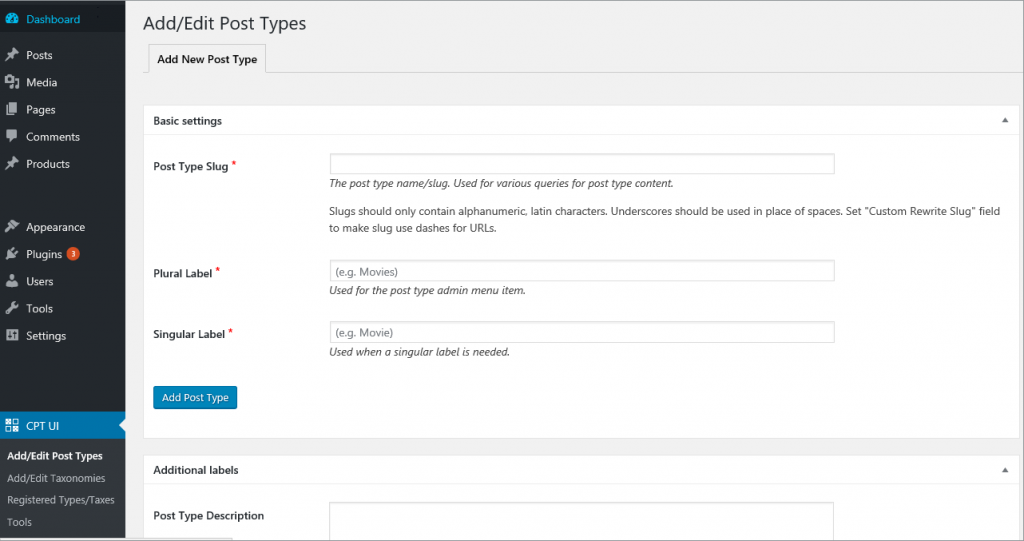
Pros:
- Intuitive and detailed UI that is simple to use.
- Intuitive and detailed UI that is simple to use.
- You can add custom post types to built-in or custom taxonomies.
- Support for various available post editor features.
- A separate listing for custom post types and taxonomies registered by the plugin.
Cons:
- This WordPress custom post type plugin simply creates the types and you need to add them to the theme yourself. As such display of the CPT is not handled.
- The plugin lacks the description for some of the more complex options.
- It does not provide the built-in feature of adding custom fields.
2. Pods – Custom Content Types and Fields
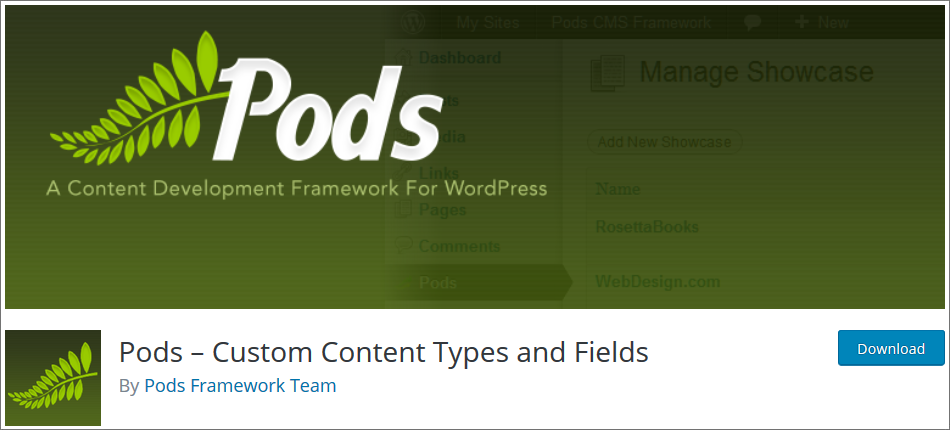
With the Pods WordPress custom post type plugin, you can create any type of content irrespective of its complexity. With a smooth interface, you can manage custom fields and content types. Pods let’s you manage all of your content needs with just one framework. You can easily create custom content types, custom taxonomies, as well as advanced content types by using the custom tables. You can also create custom settings pages with Pods in just seconds.
Pros:
- Intuitive user interface.
- This is the most option-rich and robust WordPress custom post type plugin.
- You can create completely new content types including Custom Post Types, Custom Taxonomies, and Custom Settings page.
- You can add custom fields to custom taxonomies too.
- Can create Advanced Content Types that use their own database tables.
- WordPress plugin also gives you the power to extend existing content types like Post Types, Taxonomies, Media, Users, and Comments.
Cons:
- It is complicated and even with an impressive documentation might not be easy to use for a beginner.
3. Custom Post Types and Custom Fields creator – WCK
The “WCK Custom Post Type Creator” is a WordPress custom post type plugin that provides creating custom post types with a UI that supports most of the arguments of register_post_type() function. WordPress Creation Kit or WCK allows you to create and manage custom post types. You can easily create custom taxonomies as well as custom fields and meta boxes for your posts, pages or CPT, which is one of the major benefits of using this plugin.
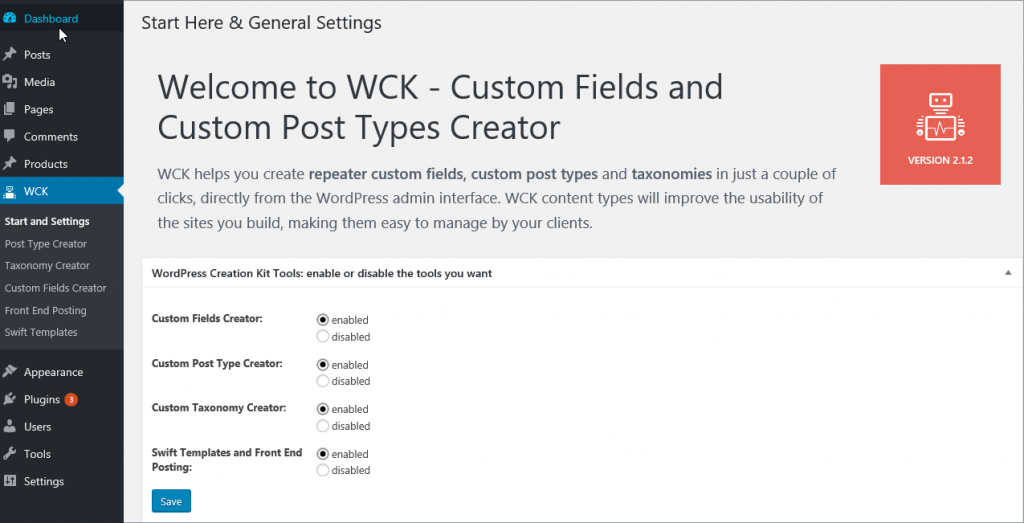
Pros:
- With a straightforward interface, this is perhaps the simplest WordPress custom post type plugin.
- The WordPress custom post type plugin lets you create and maintain custom post types, custom taxonomies and custom fields and Meta boxes for posts, pages or custom post types.
- Quick Startup Guide on “General Settings” page.
- You can organize the admin with different post types and display theme.
- Available Pro version with added features and functionalities.
Cons:
- With the free version, there is undue bloatware as advertisements for the Pro version.
4. Toolset Types – Custom Post Types, Custom Fields and Taxonomies
Toolset allows you to create custom post types, custom fields and custom taxonomies without any PHP coding making it a great option for beginners and expert developers hoping to save time when building their websites. If you want to create custom posts, custom fields and taxonomies without any PHP coding then Toolset types is for you. It is great for beginners and developers who want to save time and effort. Toolset allows you to create blocks with dynamic content using Gutenberg editor via Toolset Blocks. You can also use Toolset blocks to create custom templates, archives, and searches. Along with create complex features like custom search, maps, sliders, etc.
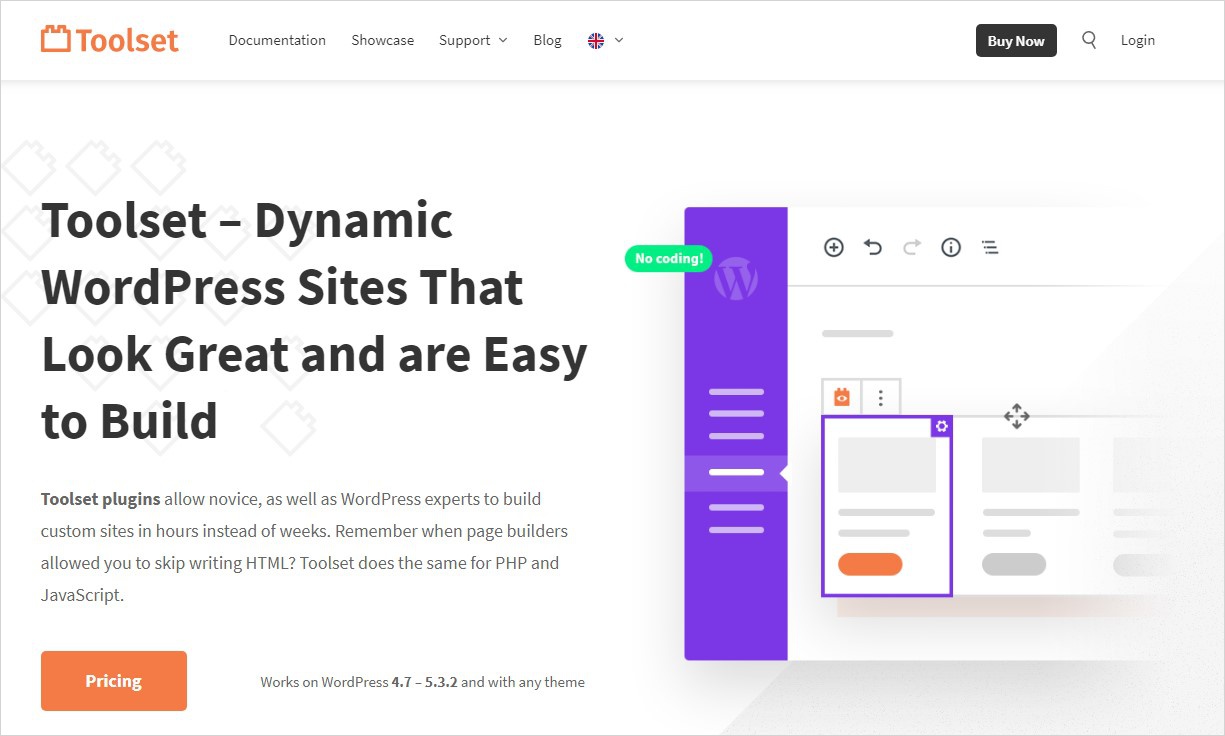
Pros:
- Toolset offers the ability to create post relationships which make it easier to manage your website by connecting relevant posts with each other. You can also add repeatable field groups to your custom fields so you can repeat a set of fields in just one click.
- Toolset has recently released Toolset Blocks which gives you the chance to create blocks with dynamic content using the Gutenberg editor. You can also easily build your custom post type templates, archives and searches using Toolset Blocks.
- Toolset is completely integrated with a host of popular plugins including WooCommerce, WPML and Elementor as well as major themes including OceanWP and Astra.
- Not only that but Toolset enables you to create other complex features including a custom search, front-end forms, sliders and maps.
- If you’re looking for a plugin which supports custom post types and gives you the chance to add important features every custom website needs then Toolset is a great option.
5. Custom Post Type Maker – WordPress Custom Post Type Plugin
“Custom Post Type Maker” plugin lets you create custom post types and custom Taxonomies in a user-friendly way. It fully integrates with the WordPress API and provides support for almost all parameters of the Custom Post Type API. Custom Post Type Maker is a great plugin to create custom post types and custom taxonomies in a user-friendly manner. It makes it very simple to manage your posts and pages.
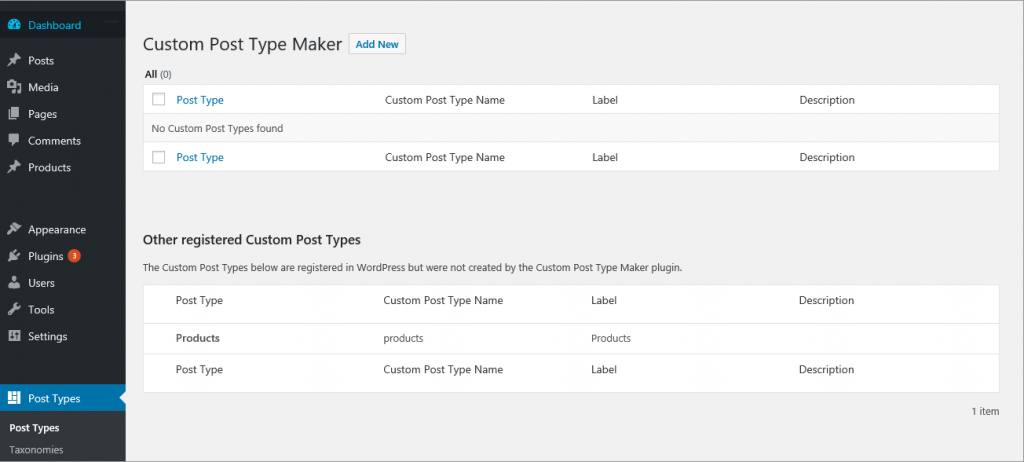
Pros:
- Uncluttered UI with separate sections for “Post Types” and “Taxonomies”.
- It provides you with an interface to manage custom post types like regular post and pages.
- Provides most features offered by a WordPress custom post type plugin.
- Lets you set almost all parameters of the CPT API.
Cons:
- The plugin does not handle the display of custom post types and taxonomies.
- This plugin has not been updated for quite some time. As such it is not widely used and not active on many WordPress sites.
Bonus WordPress Custom Post Type Plugins
6. MB Custom Post Type
The “MB Custom Post Type” plugin lets you create and manage custom post types and taxonomies easily with an easy-to-use interface. You can easily manage all of the post types, arguments, and taxonomy arguments like admin bar label, menu labels, disable archive pages etc. very easily, with using PHP coding.
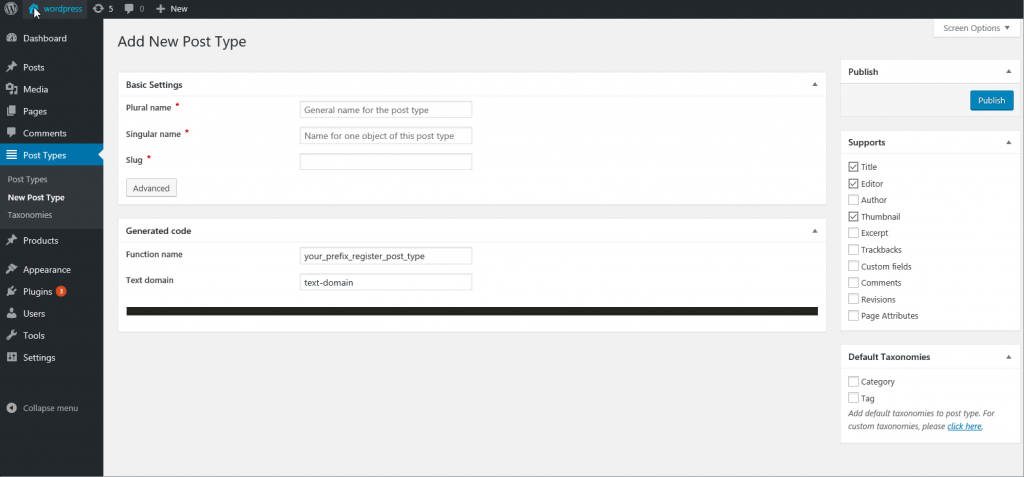
Pros:
- This WordPress custom post type plugin supports all post type’s arguments with no need to write custom PHP code.
- It is lightweight, powerful and easy-to-use.
- Supports live editing mode, which fills the necessary labels for you automatically.
- Import/Export support for registered custom post types.
- It can be extended with extensions.
Cons:
- Needs install of the MetaBox plugin.
7. Custom Post Types Unlimited plugin – Best WordPress Custom Post Type Plugin
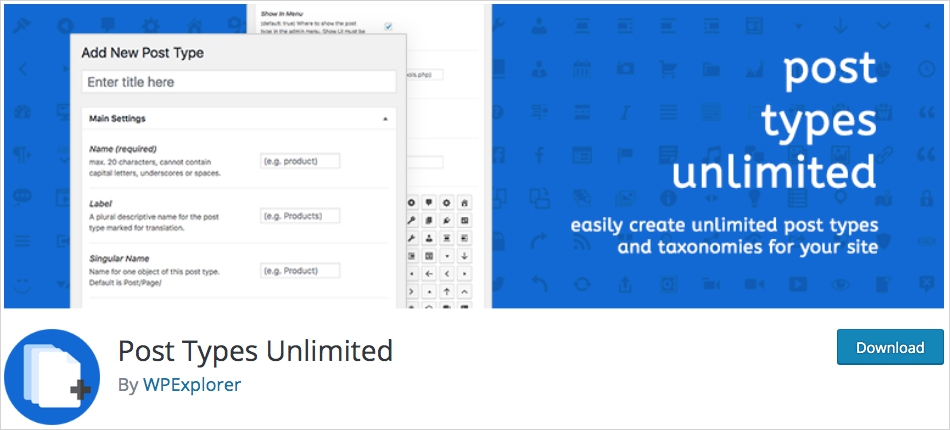
The Custom Post Types Unlimited plugin allows you to add your own custom post types and taxonomies to your website via the WordPress admin. All post type and taxonomy parameters (label, custom menu name, icon, slug, etc.) are available when adding or editing items. The plugin smoothly works with any theme and is easy to translate. You can easily create custom post types and custom taxonomies that are controlled by your theme.
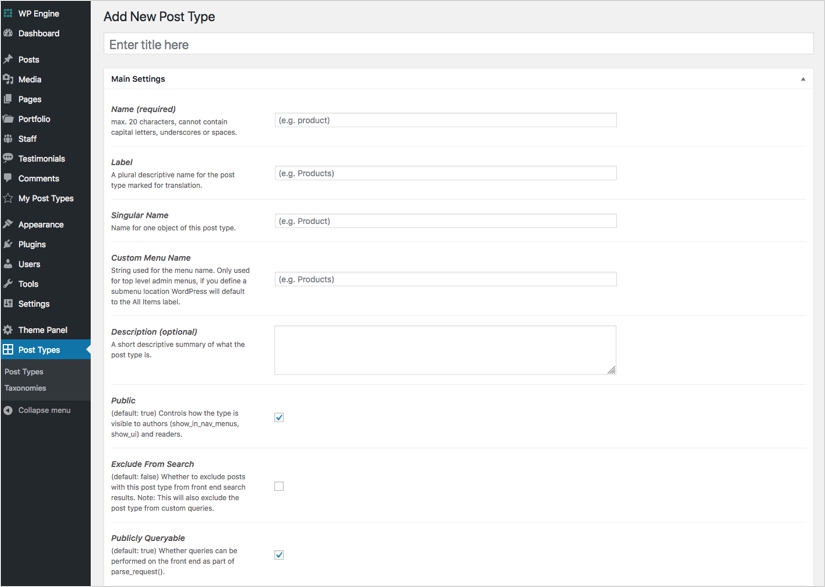
Pros:
- Easy to get started
- Add unlimited post types/taxonomies
- Uses core WordPress interface
- Not ads or “pro” version upsell – the plugin is completely FREE
- Developer friendly (hooks available to add your own settings to admin)
Cons:
- No options for adding custom fields to your post types
8. Custom Post Type Maker

The WordPress custom post type maker plugin lets you generate custom post types from the WordPress admin which is very easy to understand. The plugin allows you to create custom post types and custom taxonomies in a user-friendly way. So you can mange them just like regular posts. It provides an interface to manage the custom post types with all the parameters of the WordPress CPT API.
Pros:
- The interface is easy to use.
- Lets you create custom post types and custom taxonomies without coding.
- Manage custom post type icon with WordPress media uploader or dash icons.
Cons:
- Does not display custom post types and taxonomies.
- Not updated frequently.
Manually Creating a WordPress Custom Post Type
It is to be noted that the custom post types will disappear if the plugin is deactivated. The data pertaining to the custom post types is retained. However, the custom post type will be unregistered and inaccessible from the admin area.
Let us look at alternate ways to create custom post types manually.
How to Create Custom Post Types
To create a new custom post type, you will need to use the register_post_type()function from WordPress:
<?php register_post_type( $post_type, $args ); ?>
This function allows you to create a new post type by its labels, supported features, availability and other parameters.
The register_post_type() function accepts two parameters:
- $post_type – The name of the post type.
- $args – An array of arguments that define the post type.
Let us now look at an example to create a custom post type. You can register a post type in two places:
- Inside the functions.php file for the theme.
- Inside a custom Plugin
It is recommended to register a custom post type in a plugin since you will avoid losing the post type registration when you switch themes.
Code to register a post type “products” in a theme’s functions.php:
function register_my_post_type() {
$args = array(
'public' => true,
'label' => 'Products'
);
register_post_type( 'products', $args );
}
add_action( 'init', 'register_my_post_type' );In the WordPress admin dashboard, a new menu called Products is added as shown below.

This wordpress custom post type plugins also adds the admin UI for the new custom post type. The new menu item allows adding new product entries or editing existing ones like posts and pages in WordPress. This is a simple example, but the complexity of your custom content would determine the different arguments you can pass to this function. Refer to the codex wiki for more details on the arguments accepted by this function.
Display Custom Post Type Data with WP_Query()
If you want to display custom post type data then you can use WP_Query()to get custom posts within the Loop. The WP_Query()function accepts a post_type parameter that determines the content type to return. In the example below, we display all product entries in WordPress.
$args = array (
'posts_per_page' => '-1',
'post_type' => 'products'
);
// Custom query.
$query = new WP_Query( $args );
if ( $query->have_posts() ) {
// Start looping over the query results.
while ( $query->have_posts() ) {
$query->the_post();
?>
<h1><?php the_title() ?></h1>
<div class='content'>
<?php the_content() ?>
</div>
<?php
}
}
wp_reset_postdata()How to Display Custom Post Type Category in WordPress
For your custom post types, you may want to display custom categories like the WordPress default post categories.
Firstly, you will need to attach the Category taxonomy to the custom post type. By default, there are no taxonomies attached to a custom post type. You need to add an additional argument ‘taxonomy’ set to ‘category’, to the function register_post_type().
'taxonomies’ => array( 'category' ),
The category pages by default display only the ‘Posts’ post type. To display your custom post types also on the same page, you need to add additional code to the theme’s functions.php file or your custom plugin.
add_filter('pre_get_posts', 'query_custom_post_type');
function query_custom_post_type($query) {
if( is_category() ) {
$post_type = get_query_var('post_type');
if($post_type)
$post_type = $post_type;
else
$post_type = array('nav_menu_item', 'post', 'Products');
$query->set('post_type',$post_type);
return $query;
}
}Category Page displaying default post types
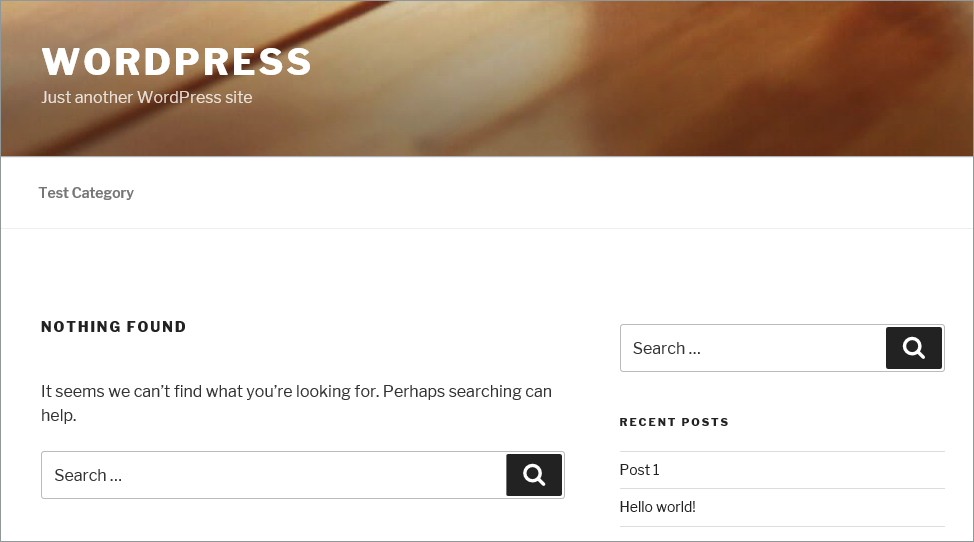
Category Page displaying custom post types
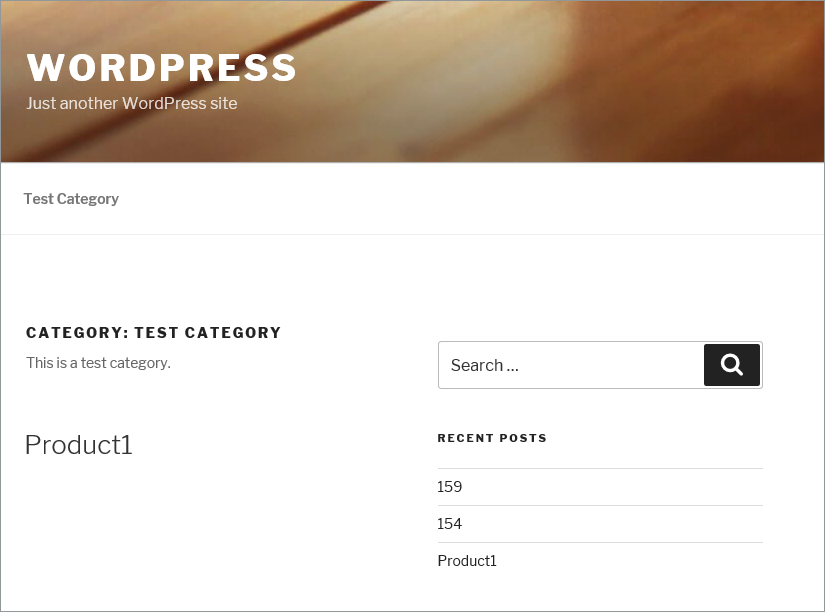
You can also display categories for a custom post type. To display the custom post type category, you need to define the taxonomy argument. Then send it to the wp_list_categories() function that is used to list categories.
$customPostTaxonomies = get_object_taxonomies('Products');
if (count($customPostTaxonomies) > 0){
foreach($customPostTaxonomies as $tax){
$args = array(
'orderby' => 'name',
'taxonomy' => $tax,
);
wp_list_categories( $args );
}
}WordPress Custom Post Type Templates
WordPress themes support custom templates for custom post types. Custom templates are supported for the single display of custom posts and archive displays. By default, WordPress will use the existing theme files that would be archive.php, single.php and index.php files. If you want to create a custom template for your custom post type, make a copy of the existing php file and edit that. WordPress follows a template hierarchy and uses the template it first comes across.
Default Custom Post Type Templates in WordPress
- single-{post-type}.php
The single post template is used when a viewer requests a single post from a custom post type. The single.php template file will be used if the single-{post-type}.php is not present.
- archive-{post-type}.php
The archive post type template is used for requests for a custom post type archive. The archive.php template file will be used if the archive-{post-type}.php is not present.
- search.php
The search results template is used to display the search results. To include search results from the custom post type, add the ‘pre_get_posts’ as shown above.
- index.php
The index.php is used if the above specific query template for the custom post type is not present.
Which WordPress Custom Post Type Plugin is best for you ?
With custom post types you can easily transform your WordPress site from a basic blogging site to a fully functional content management system. WordPress custom post type plugins are an extremely powerful feature of WordPress. There’s no limit to the extensibility that you can achieve on your website. If you are an experienced developer, then you can use the WordPress functions directly to create and manage custom post types. You can use these custom post types plugin for WordPress to build complex websites easily. In fact, with the help of these plugins it is easier to make your website stand out and look unique.
You can also choose to use one of the many WordPress custom post type plugins that provide much more than the basic functionality. We’ve provided you with the list of best WordPress custom post type plugins, so you can choose what suits your website requirements.
Lastly, you can try TemplateToaster, a WordPress theme creator tool which provides enhanced themes and features to create websites with all the custom features you may need.
Build a Stunning Website in Minutes with TemplateToaster Website Builder
Create Your Own Website Now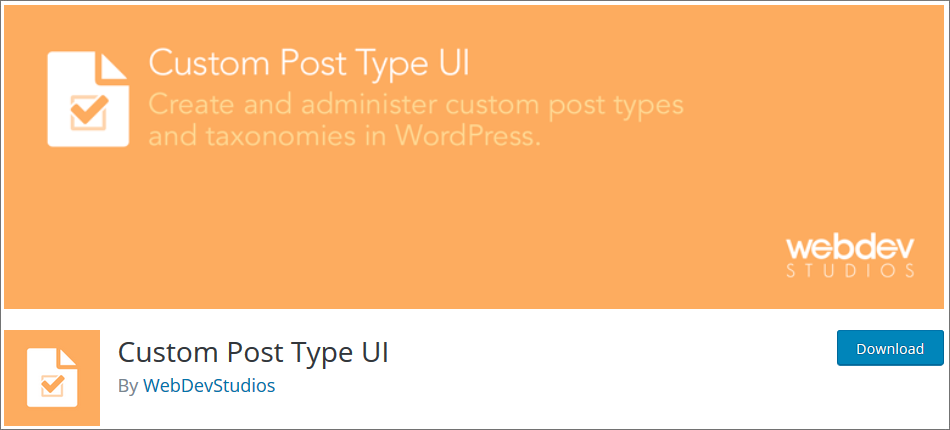
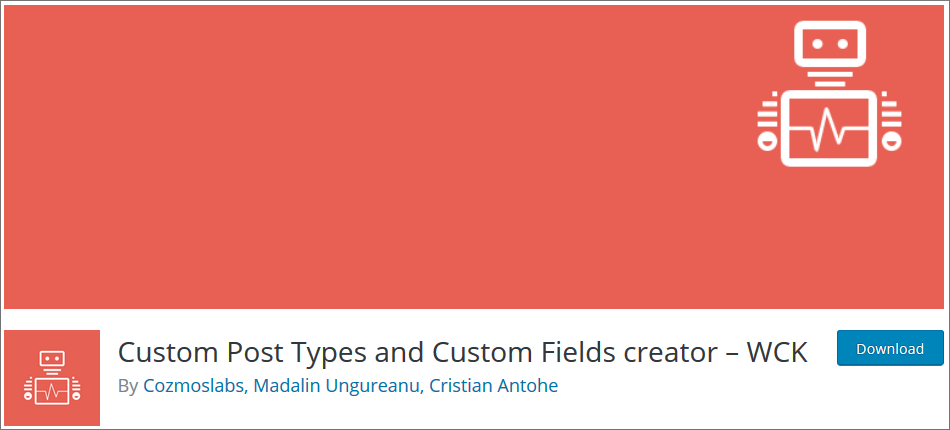
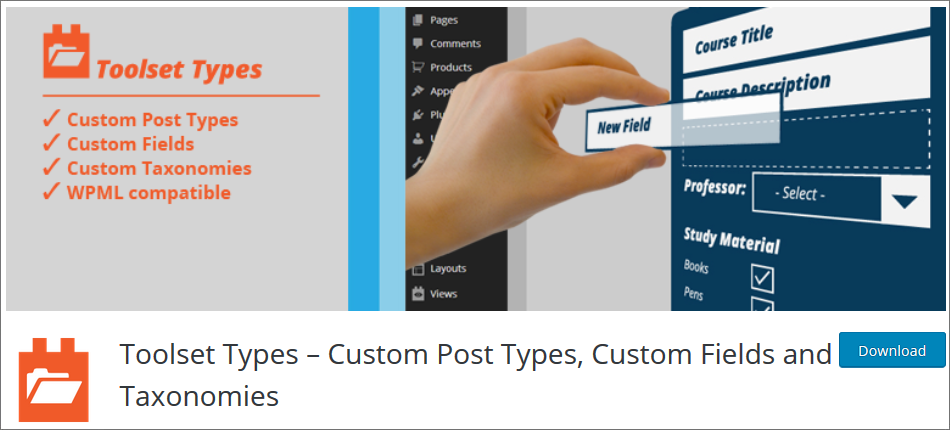
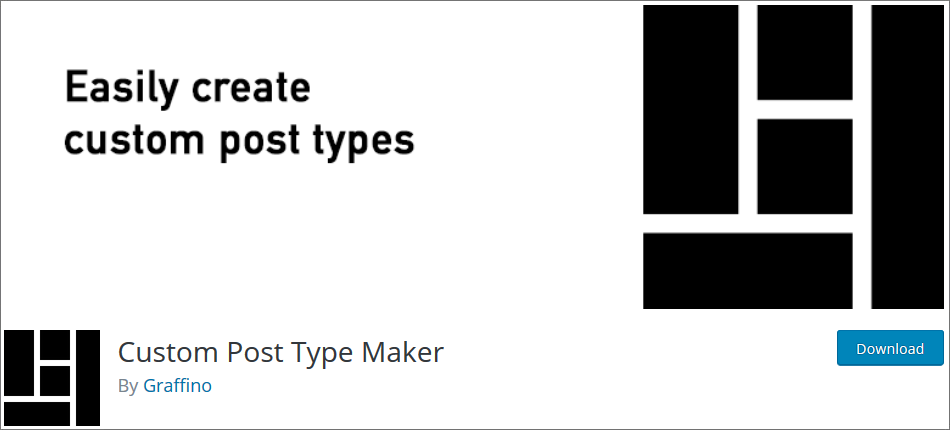
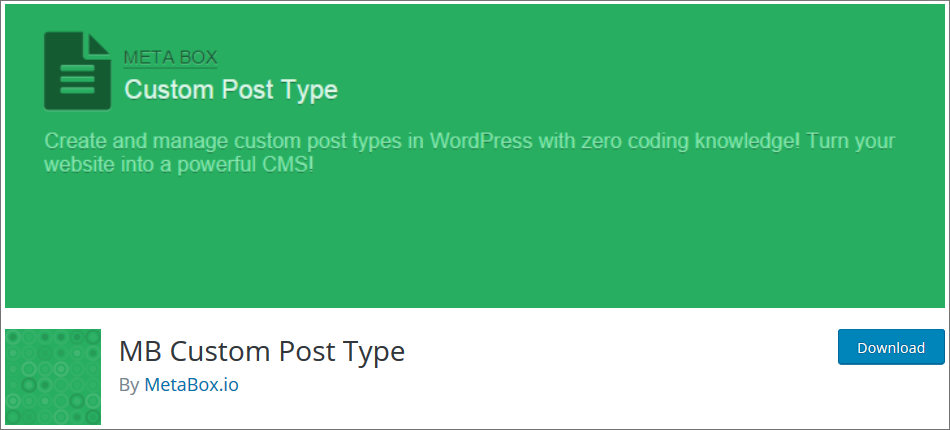
Hi Param Chahal, Thanks for sharing useful information.
I would like to share one more plugin is Blog Designer Pro.
This plugin helps you to create custom post type easily. It has unique 40+ high-impact blog templates that help you to modify your blog page or single page layout as per your requirement.
Add this awesome plugin to article https://wordpress.org/plugins/custom-post-types/ 😀
Why is ACF, ACF/Pro not in this list?
It would be great if you could also include my Post Types Unlimited plugin in your list. It’s a very slim plugin without any upsells (there will never be a pro version) and uses all core functionality and it’s also developer friendly, so theme and plugin developers can hook into the plugin to add extra settings to the Post Type and Taxonomy admin pages specific for their products.
Thank you for considering!
I like the feature of Custom Post Type UI Plugin, how to install this?
Custom Post Type UI and Toolset Types both are best plugin for custom type.